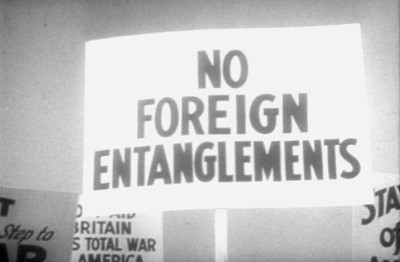“You know this isn’t simply a matter of your friends being taken out of school to join the Army.” Leon leaned forward in his chair. “You know what this war’s really about? Profiteering. And I’ll be the first to tell anyone all about the importance of profits. But this isn’t worth it. It’s not worth our boys dying so the East Coast bankers and industrialists can profit off their blood. We need to protect your friends from the profiteers. “ – Moonlight, Chapter 6
Before Pearl Harbor, support for American isolationism dominated the American political landscape. The United States had a strong tradition against involvement in European war conflicts since the days of its founding. In 1940, America was still recovering from the Great Depression. With the focus on domestic issues, Americans did not want to be drawn into a war in Europe after WWI. The Neutrality Acts, effected on August 31, 1935 and restricted American companies from selling arm materials to “belligerent” countries, was passed as a direct reaction to WWI to curtail American involvement in foreign wars.
Americans generally felt their entry into WWI was a mistake. Many believed WWI was a war heavily influenced by British propaganda, and mainly benefitted greedy New York bankers, international arms dealers, and war profiteers. These sentiments were strongest in the Midwest, and in particular in Illinois and Chicago, where manufacturing dominated the local economy. Anglophobia within the large Irish and German communities was another driving force for Midwest support for isolationism. Anti-Semitism too, played a role, as some believed the Jews were the main proponents of American involvement. Support against intervention ran across political lines, from liberal pacifists and communists, to conservatives concerned with social changes brought about in the aftermath of WWI.
[kad_youtube url=”https://www.youtube.com/watch?v=GEMW3d2ZOGU&feature=youtu.be” ]
Anti-war sentiment began to sway after the fall of France, when in 1940 President Roosevelt urged Congress to adopt the first peacetime draft in the United States’ history, and proposed the Lend-Lease program to provide economic and military aid a bankrupted Great Britain. While unwilling to directly engage in the war, Americans did not feel comfortable with the notion of the fall of the last democratic country in Europe. At the same time, these political initiatives intensified the isolationists’ fears. Anti-war groups waged a heavy campaign against Lend-Lease, and the America First Committee was formed. The isolationists (aka anti-interventionists) saw any action that deepened American involvement as a risk to lead the United States into ultimate participation in the war. Their views may be extreme, but to some extent, it might also be true.
In the next segment of this 3-Parts Blog series, I will discuss the America First Committee (AFC), which was based on Chicago and claimed 135,000 members in 60 chapters in Illinois. In Part 3, I will discuss the Committee to Defend America (CDA), which was formed by proponents of American intervention who believed American security was dependent on the defeat of Germany. The debate between the isolationists and the interventionists deeply divided the nation, no less so that politically divisive issues of today.
In Rose of Anzio-Moonlight, I had incorporate this historical background to the extent that it would give readers a sense of how things were in Chicago at the time. Many influential Americans, including some in Chicago, were among the staunchest supporters of the isolationist movements. The ones I alluded to in Moonlight included Robert R. McCormick, then editor-in-chief of the Chicago Tribune, and Robert E. Wood, VP of Sears, Roebuck. The Chicago Tribune, in fact, was strongly against Roosevelt, and constantly searched for proof of his interventionist agenda. (One could argue though that FDR indeed supported American involvement.)
Other notable and wealthy Americans who supported isolationism included U.S Ambassador Joseph P. Kennedy, H. Smith Richardson of the Vick Chemical Company, Sterling Morton of Morton Salt, New York Daily News publisher Joseph M. Patterson, and former Undersecretary of State William Castle. In Moonlight, I used the character Leon Caldwell to reflect the status and sentiments of these supporters.
“I’m funding it. So is Robert Wood.”
“Robert Wood? Sears Roebuck’s Chairman?”
Leon nodded. “And Bob McCormick. With Bob on board, we’ll have a strong, influential voice through the Chicago Tribune.”
The most outspoken and prominent supporter, however, was Charles Lindbergh. Here, I leave you with Lindbergh’s famous/infamous speech on September 11, 1941 in Des Moines, Iowa, against American entry into the war.
[kad_youtube url=”http://youtu.be/K_F48oaOskI” ]
To see the full transcript: Lindberg Des Moines speech
*Check out my FB page to see some of the isolationists and interventionists propaganda at the time: Alexa Kang FB Author’s Page
*For further reading:
WWII Neutrals: Isolationist America (1939-1941)
The Great Debate: Internationalists vs. Isolationists
